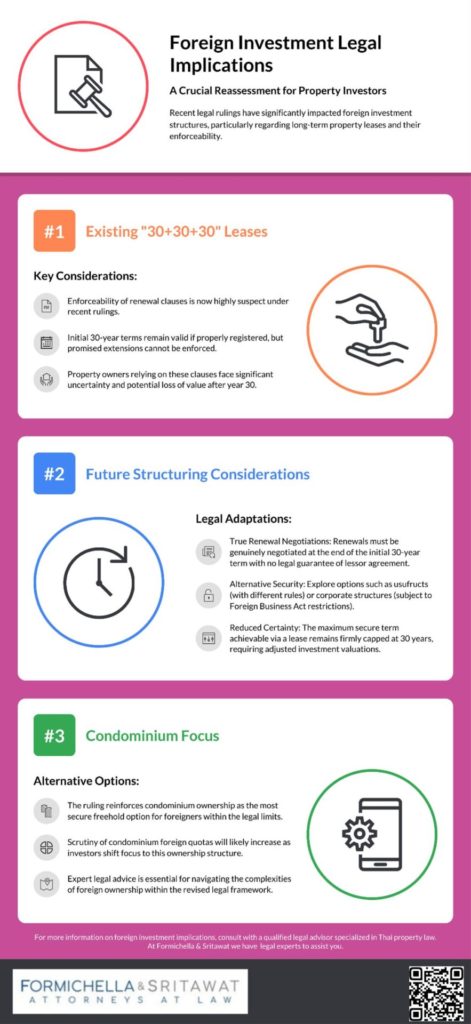Thai Supreme Court Shuts Door on Long-Term Lease Loopholes: Foreign Property Investors Face New Reality

Thailand’s attraction for foreign residents and investors often centres on lifestyle and opportunity. However, navigating property ownership remains a significant hurdle due to strict legal prohibitions on foreign land ownership, except for specific exceptions, such as BOI-promoted projects or designated industrial zones (IEAT). For decades, long-term leases structured with renewal options (often referred to as "30+30+30" leases) have offered a popular, albeit legally contentious, path for foreigners seeking extended control over Thai land and houses. A landmark Supreme Court ruling issued on March 18, 2025 (Case No. 4655/2566) has now decisively closed this door, sending shockwaves through the real estate sector and forcing a major rethink for foreign property seekers.
The Established Framework: Condos and the Elusive 30-Year Lease
Under Thai law, the primary avenues for foreign property acquisition are clear:
- Condominium Freehold: Foreigners can own units outright under the Condominium Act, subject to the 49% foreign quota per project.
- Leasehold: Long-term leases, capped at 30 years by Section 540 of the Civil and Commercial Code (CCC), became the go-to solution for land and houses. Crucially, Section 538 mandates that leases exceeding three years must be registered with the Land Department to be enforceable beyond three years.
Seeking stability beyond the initial 30 years, developers, lawyers, and investors commonly employed structures involving pre-agreed renewal clauses or consecutive lease agreements signed upfront, effectively promising control for 60, 90, or even 99 years. This practice, while widespread, always existed under a legal cloud.
The Ruling: Supreme Court Rejects "30+30+30"
The Supreme Court's March 18th decision obliterated the legal foundation of these extended lease arrangements. As reported by The Bangkok Post and The Nation Thailand, the Court ruled unequivocally:
- Strict 30-Year Limit Enforced: Any lease provision attempting to grant a term exceeding 30 years from the commencement date is void beyond the initial 30 years.
- Pre-Agreed Renewals are Invalid: Clauses stipulating automatic renewal for subsequent 30-year terms at the end of the initial lease are invalid and unenforceable, regardless of:
- The parties' mutual agreement at the outset.
- Any rental payments made for the purported renewal periods.
- Registration of the original agreement with the Land Department.
- Structuring Attempts Fail: Schemes using multiple pre-signed lease agreements or pre-agreed extensions designed to circumvent the 30-year ceiling were also deemed invalid. The Court focused on the substance (attempting to secure rights beyond 30 years from the start) over the form.
- Public Policy Paramount: The Court grounded its decision in public policy concerns. It highlighted the inherent uncertainties and potential for unfairness over excessively long durations (60-99 years), including unpredictable changes in property values, conditions, and the obligations of future parties bound by a contract signed decades prior.
Industry Reaction: Validation and Concern
The ruling, while clarifying long-standing legal ambiguity, has caused significant concern. The Thai Real Estate Association acknowledged the impact, stating it necessitates "immediate adjustments in standard practices and clearer communication with foreign clients." International property consultants, such as CBRE Thailand and JLL Thailand, have advised clients to review existing agreements and explore alternative structures urgently.
Legal experts broadly agree that the ruling was predictable based on a strict reading of Section 540 CCC. Dr. Samrit Srichan, a prominent Thai property law scholar, commented to The Bangkok Post: "The Supreme Court has consistently leaned towards a strict interpretation of the 30-year limit. This ruling finally removes any lingering doubt – pre-agreed renewals designed to act like a single long term are against the law and public policy."
Implications for Foreign Investors: A Crucial Reassessment
- Existing "30+30+30" Leases: The enforceability of the renewal clauses is now highly suspect. While the initial 30-year term remains valid (if properly registered), the promised extensions cannot be enforced. Property owners relying on these clauses face significant uncertainty and potential loss of value after year 30.
- Future Structuring: Simply structuring leases with pre-agreed renewals or consecutive terms upfront is no longer a viable option. Lawyers are now emphasizing:
- True Renewal Negotiations: Renewals must be genuinely negotiated at the end of the initial 30-year term. There is no legal guarantee that the lessor will agree, or on what terms.
- Alternative Security: Exploring options such as usufructs (which have different rules but also complexities) or corporate structures (subject to Foreign Business Act restrictions) may be considered, but require expert, individualized legal advice.
- Reduced Certainty: The maximum secure term achievable via a lease remains firmly capped at 30 years. Investors must factor this reduced long-term security into their plans and valuations.
- Condominium Focus: The ruling reinforces condominium ownership as the most secure freehold option for foreigners within the legal limits. Scrutiny of condo foreign quotas will likely increase.
Conclusion: Clarity at a Cost
The Thai Supreme Court's ruling provides much-needed legal clarity, bringing an end to years of reliance on a legally precarious structure. However, this clarity comes at a significant cost to foreign investors' long-term security over Thai land and houses. The era of easily marketable "virtual freehold" leases spanning 60-99 years is definitively over.
Prospective foreign buyers must now enter leasehold agreements with eyes wide open: the 30-year limit is absolute, and agreements beyond that are legally hollow. Thorough due diligence, realistic expectations about leasehold tenure, and consultation with experienced, reputable Thai legal counsel specializing in property law are now more critical than ever. This ruling underscores the fundamental principle that foreign land ownership in Thailand remains tightly restricted and attempts to circumvent these restrictions through creative lease structures face an increasingly unforgiving legal landscape.
References:
- Civil and Commercial Code of Thailand: Sections 538, 540 (Primary Legal Basis).
- Supreme Court of Thailand: Decision No. 4655/2566, dated 18 March 2025 (Core Subject of Ruling).
- The Bangkok Post: "Court ruling resets foreign lease terms" (Article dated approx. March 20-25, 2025).
- The Nation Thailand: "Supreme Court deals blow to long-term property leases for foreigners" (Article dated approx. March 20-25, 2025.
- Thai Real Estate Association: Public Statements/Internal Memos (reported in above media or via press releases).
- Condominium Act B.E. 2522 (1979): Governs foreign freehold condo ownership.





